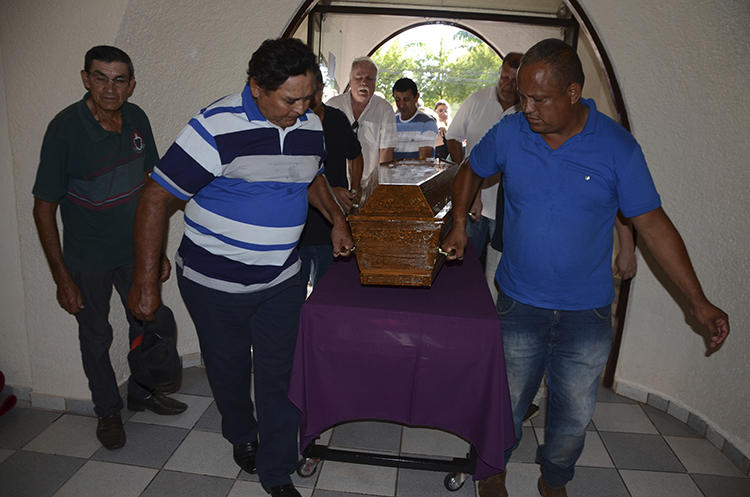Rio de Janeiro, February 14, 2020 — Authorities in Brazil and Paraguay must work together to promptly and thoroughly investigate the killing of Brazilian journalist Lourenço “Léo” Veras and bring those responsible to justice, the Committee to Protect Journalists said today.
On February 12, at about 9 p.m., masked men shot and killed Veras, the owner and manager of Porã News, a news website covering organized crime, at his home in the Paraguayan city of Pedro Juan Caballero, which borders the Brazilian city of Ponta Porã, according to a report by Brazilian broadcaster G1.
The men drove to Veras’ home in a white truck and raided the journalist’s home while he was having dinner with his wife, son, and father-in-law, according to Paraguayan daily ABC Color.
Veras tried to escape, but the attackers shot him in the leg, and proceeded to shoot him 11 times, including once in the head, according to that report. He was brought to a local hospital following the attack and died shortly afterwards, according to ABC Color.
Porã News covers organized crime, policing, and drug trafficking-related issues on the Brazil-Paraguay border. According to another ABC Color report, Ignacio Rodríguez, the director of police in Amambay, Paraguay, said the attack may have been retaliation for material published by Porã News.
“The Paraguay-Brazil border continues to be one of the most dangerous places for journalists in South America,” said CPJ Central and South America Program Coordinator Natalie Southwick in New York. “Authorities on both sides of the border must take swift action to investigate the killing of Léo Veras, bring those responsible to justice, and ensure other journalists in the region are not terrorized or killed for doing their jobs.”
Carlos Eduardo, an investigator with the Civil Police in Brazil’s Mato Grosso do Sul state, told CPJ in an email that Paraguayan authorities are responsible for investigating Vera’s killing, but said that the civil police are working with their Paraguayan counterparts to look into whether the killers fled to Brazil after the attack.
According to a statement by the National Federation of Journalists in Brazil, an association of journalists’ unions, Veras had previously reported receiving death threats in relation to his work. In an interview with Brazilian broadcaster TV Record that aired on January 28, Veras described receiving numerous threats from drug dealers as a consequence of his reporting.
Veras previously worked for six months as a regional correspondent for ABC Color, and worked occasionally as a correspondent for other media outlets in the Brazilian border state of Mato Grosso do Sul, according to ABC Color.
The newspaper reported that during his time as a correspondent, Veras was granted police protection due to a series of threats he received from members of an organized crime group.
The Brazilian Association of Investigative Journalism (Abraji), a local trade and press freedom group, said in a statement that people close to Veras told the organization that the journalist was concerned about the escape of 75 detainees from a prison in Pedro Juan Caballero in January, many of whom had ties to Brazilian organized crime.
A journalist working in Pedro Juan Caballero, who spoke to CPJ on the condition of anonymity, citing security concerns, said they were similarly afraid, and believed some of the escapees might try to target journalists they had previously threatened.
The association’s statement said that Veras had worked for more than 15 years in the border region around Pedro Juan Caballero and Ponta Porã, one of the main entry points of arms and drugs in Brazil.
In 2015, Paraguayan radio journalist Gerardo Ceferino Servían Coronel was shot and killed in Ponta Porã, as CPJ documented at the time. ABC Color journalist Cándido Figueredo Ruíz, who received CPJ’s International Press Freedom Award in 2015, has faced repeated death threats and has a round-the-clock police protection detail.
CPJ emailed the Brazilian Federal Police, the Paraguayan National Police, and the Paraguayan Public Prosecution’s Office, but did not receive any responses.
When CPJ called the Paraguayan consulate in the city of Ponta Porã, a staffer who answered the phone said the consulate did not have any official statement to share.
In a documentary made by Abraji in 2017, Veras spoke about the threats he had received, saying, “My wife and I, we hardly attend any social events and parties around, unless it is in a place I know is safe.”
He added, “We have to die one day. I always hope that my death won’t be so violent, with too many rifle shots. Here, if a hitman wants to kill you he comes to your door, tells you to open it and he will shoot you. I hope that it will only be one shot in order not to cause too much damage.”
[Editors’ note: This article has been updated in its seventh paragraph to include a response from the Mato Grosso do Sul Civil Police.]
